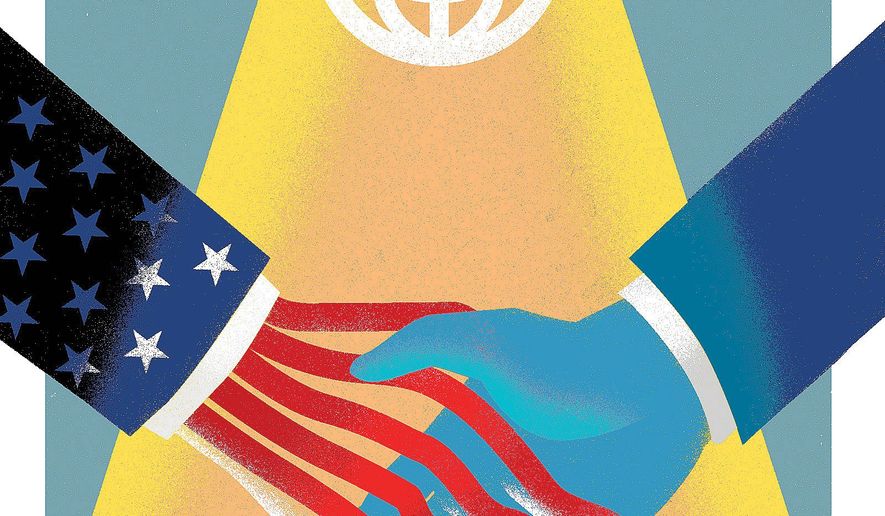OPINION:
Historians often cite two American qualities to explain why the United States and its allies prevailed in the Cold War; military strength and better ideas — such things as the rule of law and freedom for individuals and the marketplace; often called “Soft Power” in shorthand. The ultimate irony in contemporary geopolitics is that Russia and China have studied our use of Soft Power, corrupted it to suit their purposes, and today are well along in using it to win the second Cold War.
In recent years, the Russian and Chinese approach to expanding their influence outside their borders has relied on making seductive offers to finance, build, own and operate nuclear power plants. Sounds innocent enough. Often these offers also include proposals to build ports, highways, pipelines or railroads. Still, what could go wrong?
Usually, before the ink is dry, an offer appears involving military-to-military cooperation and weapons sales. There is usually an indebtedness included in one or more of these offers; an indebtedness which unless honored is turned into equity. And before long the host country awakens to two harsh realities — Russia or China controls their access to energy and their military, they have mortgaged their infrastructure, and have little prospect of servicing a growing mountain of debt. In very little time, their sovereignty has become a chimera. Call it what it is; The New Imperialism.
You may ask why the United States can’t compete. Why can’t we simply offer to build a better power plant? The short answer is that we’re trying. Today, American companies have designed and are seeking approval to market the next generation of nuclear technology; a smaller, safer, cheaper, modular reactor that can provide clean reliable power to tens of millions of consumers in the decades ahead.
Still, two things stand in the way of this cutting-edge technology ever going into production, or of our ever catching up with Russia or China.
The first is that international competitions worth hundreds of billions of dollars over the 80-year life of the plant are not carried out on a level playing field. When we’re competing against Russia or China, they’re able to subsidize the development, marketing and the offering price tendered by their state-owned companies. In short. Russia and China can simply “buy the project.”
Authoritarian states do that. We can’t. We haven’t adopted an industrial policy that enables our government to “pick winners” and get behind them with financing and political support. But here is where our own version of Soft Power — underwritten by more than 50 years of faithfulness in our commitment to peace and stability among the countries of the Middle East is brought to bear.
Throughout their modern histories, every nation in the Middle East — and indeed throughout the world — has known that the United States operates on the basis of certain values; respect for their sovereignty and territorial integrity, fidelity to agreements openly negotiated, and an unshakeable commitment to nurturing growth and stability wherever we are asked. That counts for a lot.
The second challenge is posed by the need to assure against a country deciding to develop nuclear weapons. Our approach is to require that any country that wants our help in developing nuclear power generation must sign the Non-Proliferation Treaty (NPT) and a straightforward agreement whose terms are prescribed in Section 123 of the Atomic Energy Act.
We have concluded such agreements with 26 countries and cooperated with them in developing their nuclear plants for more than 50 years. Today, two of our most technologically advanced American companies are offering to provide next-generation small modular reactors (SMRs) to Jordan. Jordan has signed the NPT, agreed to the additional protocol of the IAEA, and wants to sign a standard 123 agreement.
Such a decision on Jordan’s part would create the strongest possible non-proliferation guarantee. A 10-year 123 Agreement would allow our companies to compete against China for the deployment of SMRs and prevent China from penetrating Jordan and undermining its sovereignty.
With careful focus and good will, the obstacles to nuclear cooperation can be overcome. When we engage with any country, they are chiefly concerned about their own security, not just energy. What threats do they face? What will it take to deter conflict or to prevail if deterrence fails?
For decades, our country has engaged allies in negotiations until both sides agree and accept the terms that will meet their needs. At the end of such a negotiation with Jordan, both sides will come away with an agreement that assures they will be protected against any plausible threat in their region. Underwritten by decades of mutual trust and respect, such agreements are more honored — and therefore more reliable — than standardized restrictions in a perishable agreement.
Let’s be clear: We’re entering the Soft Power fight of our lives. Today, Russia and China are in a position to run the table in the Middle East. We’re about to see whether our country can make the comeback of the century. Any alternative holds incalculable consequences.
• Robert McFarlane served as President Reagan’s national security adviser.




Please read our comment policy before commenting.